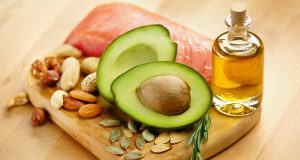Nutritional newsflash – the majority of American diets are missing seven or more essential nutrients!
Before you reach for that bottle of supplements, why not try eating those missing nutrients for breakfast, lunch and dinner instead? Yes, the best way to get quality nutrition is not in a bottle, it’s in eating whole, clean foods. Let’s review a few!
“If you want to grow big and strong, you’d better drink your milk!” We all grew up hearing it; we all know that calcium is essential for strong, healthy bones. While that is true, there are a few other players in the bone health game. We now know that vitamin D, potassium, and magnesium are just as crucial to bone health as calcium. This is because they help calcium do its job within the body.
Dark leafy greens like bok choy, kale, turnip greens, and collard greens are good sources of all three. One cup of cooked greens contains about 200 milligrams of calcium alone!
As we all know, full-fat dairy milk is a good source of calcium and vitamin D. Alternative milks like coconut, soy, almonds or cashews are good options for those who cannot (or don’t prefer to) drink dairy milk.
Almond butter is another easy way to increase your calcium intake. It’s literally ground almonds, plus a little salt. Two tablespoons of almond butter have 112 milligrams of calcium, and over 200 milligrams of potassium.
Speaking of potassium, it’s yet another vital nutrient missing in most diets. It helps to prevent high blood pressure as we age, along with ensuring optimal muscle function. Just one baked sweet potato has over 540 milligrams of potassium with a bonus 30 milligrams of magnesium. White beans, spinach, broccoli, and cantaloupe are also excellent sources of potassium.
Let’s talk fiber! Fiber serves so many purposes for the body. It helps to regulate blood sugar, it prevents the absorption of cholesterol, and promotes gut health and regularity. All of these benefits are especially helpful for diabetics as it is crucial to control blood sugar, as well as, heart health.
Without fiber, our digestive tract suffers, we develop high cholesterol that may lead to heart disease, and inflammation may increase in the body. The vast majority of Americans get less than half of the daily recommended 25 and 35 grams of fiber; experts blame a lack of plant-based foods in the average individual’s diet. Simply put, we eat far less fresh vegetables and fruits than we should.
To increase your fiber intake try noshing on: beans and lentils, avocados, artichokes, broccoli, and bell peppers. For fiber-filled snacks choose air-popped popcorn, or a handful of nuts or fresh berries.
Next up is good ole’ vitamin C. It is not only an immune booster, it also lowers levels of sorbitol, (a form of sugar that can build up in the body and damage cells in your nerves, eyes, and kidneys.) One study also showed that vitamin C is rapidly lost in the bodies of those with diabetes.
This means diabetics need more vitamin C than the average person in order to reap the benefits. Everyone knows that oranges contain vitamin C, but strawberries, kiwi, bell pepper, even chili peppers are all great sources of vitamin C, too.
Following vitamin C in the nutrient alphabet is vitamin D. Getting sufficient amounts of vitamin D is especially important for diabetics. It stimulates the pancreas and encourages insulin production, thereby helping to keep blood sugar under better control!
If those five minutes a day of sunlight isn’t enough, you can eat your vitamin D! Vitamin D-rich foods include beef, milk, mushrooms (portabella, crimini, white button), dark greens like spinach, and fish like trout, salmon, mackerel, and tuna.
Rounding out our list is vitamin E. Vitamin E improves glucose control and helps to protect blood vessels and nerves from free-radical damage.
Some studies have also shown that high doses of vitamin E may even reverse diabetic nerve damage, along with reducing risk for diabetes related cataracts and arteriosclerosis. Vitamin E can be found in nuts, nut butters, and oils like olive and sunflower.
We hope you use these tips and tricks to stock your fridge with nutritional powerhouses, and don’t let your diet be a downer!
Sources:
https://www.webmd.com/food-recipes/features/7-nutrients-your-diet-may-be-missing#6
 Diabetic Kitchen
Diabetic Kitchen





Recent Comments